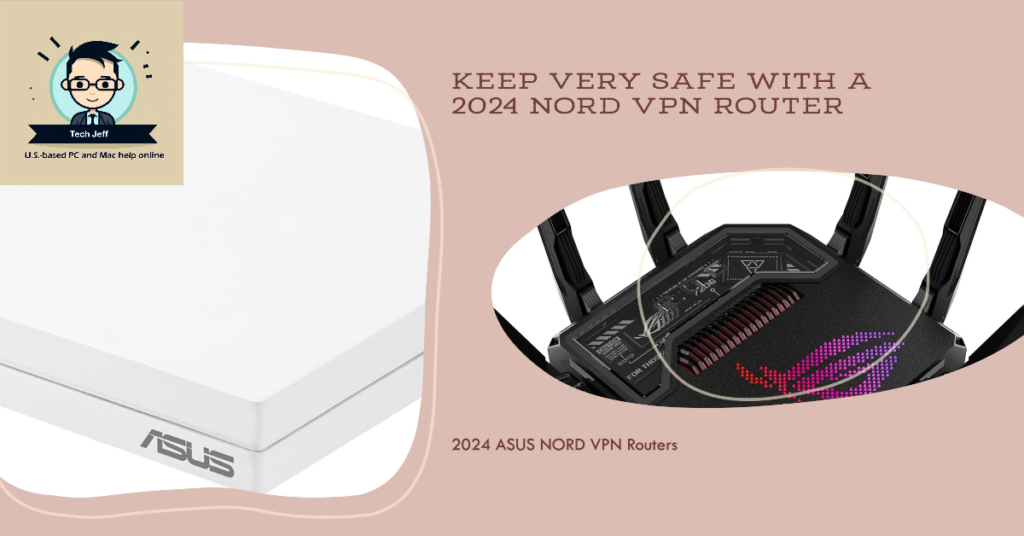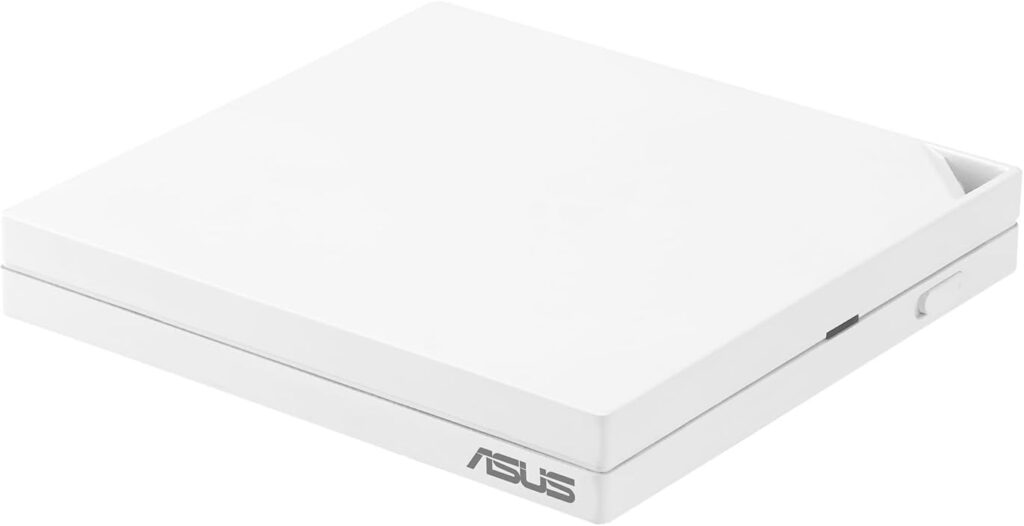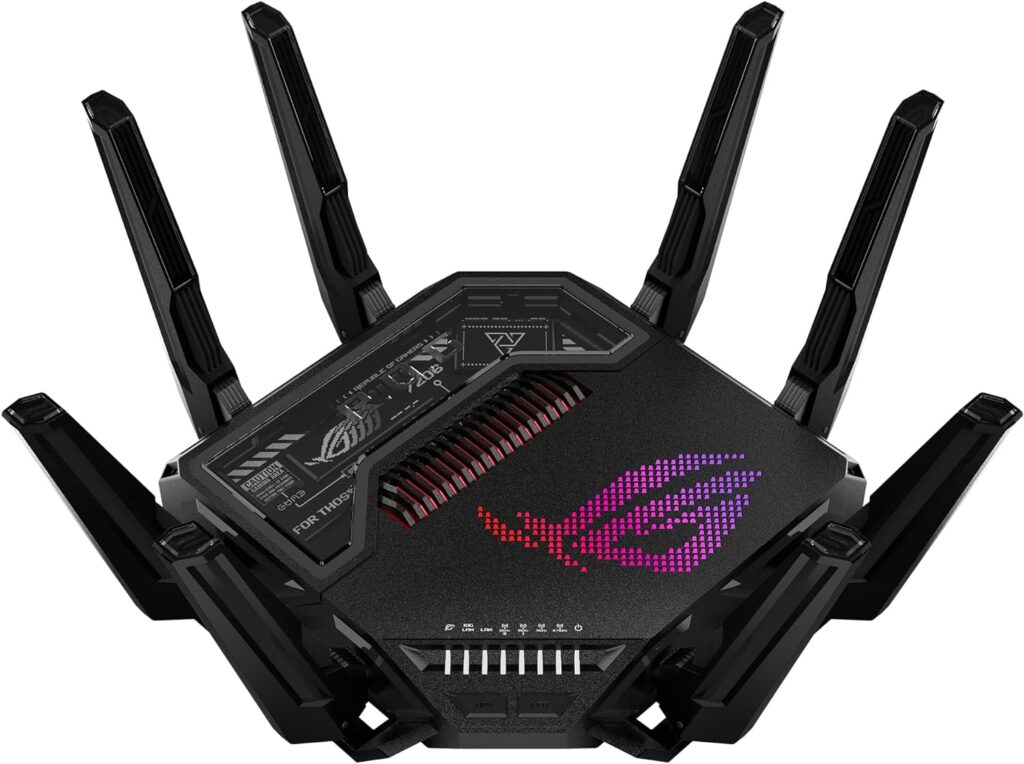💡 DIY Computer Fixes?
Grab my easy step-by-step guide and keep your computer running like new.
ASUS has teamed up with NordVPN, and now offers VPN Routers with Nord
Using a top-notch VPN is a smart way to stay safe online. To protect all your internet devices, you can use a VPN directly through your router.
Setting up a VPN on a router can be tricky, but these new routers make it easy. This partnership is great for anyone who wants better online security without the hassle.
To activate NordVPN on these routers, just enter your subscription details on the setup page. These are the first routers with NordVPN built-in, but ExpressVPN also offers routers with their own VPN setup.
ExpressVPN’s Aircove routers don’t need separate subscriptions. Just turn them on and you’re protected. They come in standard and travel sizes, and they support Wi-Fi 6 with speeds up to 180MBPs.
This makes it easy to keep all your devices secure with minimal effort!
What is a VPN router?
Imagine you’re living in a house with a bunch of roommates, and you all share the same internet connection. Now, let’s say you want to make sure all your online activities are private and secure, not just for you, but for everyone in the house. That’s where a VPN router comes in handy.
A VPN router is like a super-powered version of the regular Wi-Fi router you probably already have. But before we dive into what makes it special, let’s break down the two main parts:
- Router: This is the device that creates your home Wi-Fi network. It’s like the central hub that connects all your devices (phones, laptops, gaming consoles, and smart TVs) to the internet.
- VPN: Short for Virtual Private Network, a VPN is a service that makes your internet connection more private and secure. It’s like a secret tunnel for your internet traffic.
Now, a VPN router combines these two things into one device. Here’s why that’s cool:
Privacy and Security for Everyone: When you use a regular VPN, you usually have to set it up on each device separately. That can be a pain, especially if you have a lot of devices or if you’re not super tech-savvy. With a VPN router, once it’s set up, every single device that connects to your Wi-Fi is automatically protected. It’s like putting a force field around your entire home network.
How It Works: When you go online through a VPN router, all your internet traffic gets encrypted. This means it’s scrambled up so that if anyone tries to spy on what you’re doing online, all they’ll see is gibberish. It’s like sending all your internet data through a secret code that only the VPN can understand.
The router then sends all this encrypted data to a VPN server somewhere else in the world. This server acts like a middleman between you and the rest of the internet. When websites or online services see your traffic, they’ll think it’s coming from wherever that VPN server is located, not your actual home.
Benefits:
- Hide Your Real Location: This can be useful for accessing content that might be blocked in your country, like certain streaming services or websites.
- Protect Your Privacy: Your internet service provider (ISP) won’t be able to see what you’re doing online. This is especially important if you’re worried about your browsing history being collected and sold to advertisers.
- Secure Public Wi-Fi: If you take your laptop to a coffee shop or use hotel Wi-Fi, you’re still protected because your device is set up to always use the VPN.
- Gaming: Some VPN routers can help reduce lag in online gaming by finding faster routes for your data.
- Smart Home Security: If you have smart home devices like cameras or thermostats, a VPN router can help protect them from being hacked.
Types of VPN Routers:
- Pre-configured: These come ready to use right out of the box. They’re easier to set up but might be more expensive.
- Flashed Routers: These are regular routers that have been modified with special software (like DD-WRT or Tomato) that adds VPN capabilities. They’re cheaper but require more technical know-how to set up.
Real-World Example: Let’s say you’re really into a TV show that’s only available on a streaming service in another country. With a VPN router, you could make it look like all the devices in your house are in that country, so everyone can watch the show without having to fiddle with VPN settings on each device.
Or imagine you’re working on a top-secret project for school or work. A VPN router would ensure that all your research and communication related to the project stays private, no matter which device you use.
In conclusion, a VPN router is like a security guard for your entire home internet. It keeps all your online activities private and secure, lets you access content from around the world, and does it all without you having to set up anything on your individual devices. While it might be a bit more complex and expensive than a regular router, for many people, the added privacy and security are well worth it.
Things to Consider:
- Speed: Using a VPN can sometimes slow down your internet because your data has to travel further. However, many modern VPN routers are pretty fast.
- Cost: VPN routers are usually more expensive than regular routers. Plus, you’ll need to pay for a VPN service subscription.
- Setup: While it’s easier than setting up a VPN on every device, configuring a VPN router can still be a bit technical.
- Compatibility: Make sure the VPN router you choose works with the VPN service you want to use.
Is VPN on router free?
Short answer: Not really. Here’s why:
Special Router Needed:
-
- You need a special kind of router that can handle VPN.
- These routers cost more than regular ones.
- If you buy one that’s already set up for VPN, it’s even pricier.
- VPN Service Costs:
- Most VPNs aren’t free. You usually have to pay monthly or yearly.
- There are some free VPNs, but they’re often not good enough for routers.
- Extra Stuff:
- Sometimes you need to pay for special software for your router.
- Some VPN companies charge extra to help you set it up on a router.
Ways to Save Money:
- If you’re tech-savvy, you can add free software to some regular routers to make them work with VPNs.
- Look for VPN services that include router support without charging extra.
- VPN companies sometimes have sales, so you can get a better deal if you wait for one.
Remember, if something’s free, there’s usually a catch. Free VPNs might be slow, limit how much you can use them, or even sell your data. If you want a VPN that works well on your router all the time, it’s usually worth paying for.
Do any routers have a built-in VPN?
Yep, they do! Here’s the scoop:
What we’re talking about:
Some fancy routers come with VPN features already inside them. It’s like buying a car that already has a cool sound system installed.
What can they do?
Most let you connect to your home network when you’re away, like checking your home computer from school. Some can connect your whole house to a VPN, making all your devices more private online.
Who makes them?
ASUS, Netgear, and Synology are some brands that make these types of routers.
They often give these features cool names like “VPN Fusion” or “AiProtection”.
The downsides:
They might not do everything a separate VPN can do.
Sometimes they only work with certain VPN services.
They’re usually more expensive than regular routers.
The good stuff:
Way easier to set up than trying to add VPN to a normal router.
They often have simple controls, kind of like apps on your phone.


 VPN ROUTERS
VPN ROUTERS

